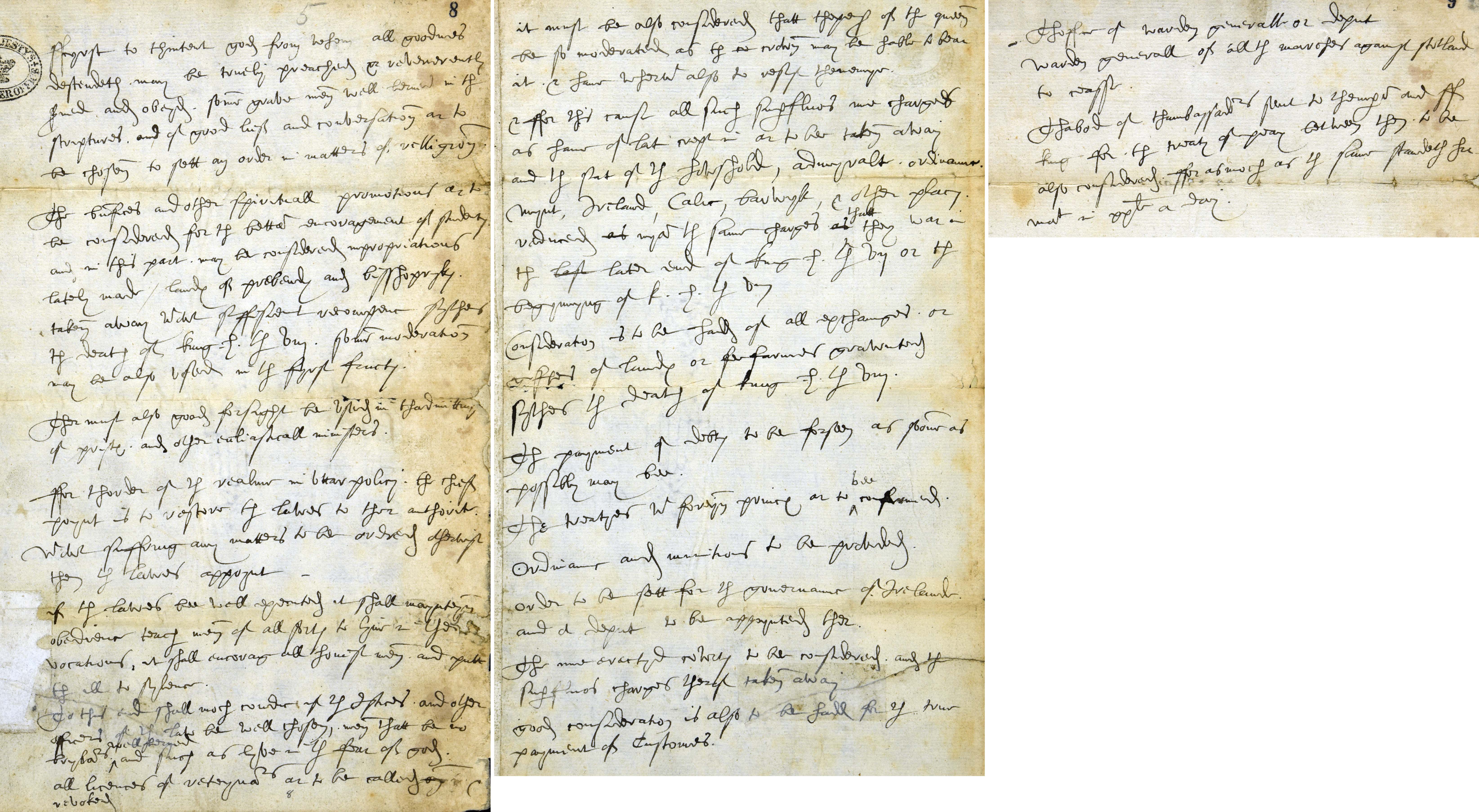
Memoranda of council business, 4 August 1553 (SP11/1/5, f.8r-9r)
This is one of two memoranda from the beginning of Mary’s reign outlining the issues she had to deal with. Although this appears to be the second one, endorsed on the 4 August, it is possible (according to F G Emmison) that it may actually have been written in July. If so, it raises the possibility that it was the first of the two memoranda written. This is important because it might suggest where Mary’s priorities, across all the issues in the memoranda, lay. This one starts with a number of issues regarding religion and gives a sense of what Mary’s government thought were the most important things to address.
Transcript
First to the intent god from whom all goodness descends may be truly preached & reverently served and obeyed, some grave men well learned in the scriptures and of good life and conversation are to be chosen to set an order in matters of religion.
The benefices [church livings] and other spiritual promotions are to be considered for the better encouragement of students and in this part may be considered impropriations[1] lately made, lands of prebends[2] and bishoprics[3] taken away without sufficient recompense since the death of King Henry VIII some moderation may be also used in the first fruits.
There must also good foresight be used in the ordaining of priests and other ecclesiastical ministers
For the order of the realm in other policy, the chief point is to restore the laws to their authority without suffering any matters to be ordered otherwise then the laws appoint.
If the laws be well executed it shall maintain obedience teach men of all sorts to honour their vocations, it shall encourage all honest men and [unclear] all to silence
To this end shall much [consider?] of the Justices and other officers of the late [king] be well chosen, men that [be no] bribes well learned and such as live in the fear of God all licenses of retainers are to be called [in]
[f. 8v]
it must be also considered that the expenses of the queen be so moderated as the country may be able to bear it & have wherewith also to resist the enemy
& for this cause all such superfluous men charged as have of late crept in are to be taken away and the state of the household, admiralty, ordinance, mint, Ireland, Calais, Berwick upon Tweed & other places reduced as near the same charges as that they war in the last later end of King H. the VII or the beginning of King Henry the VIII
Consideration is to be had of all exchanges or gifts of lands or fee farmes[4] granted since the death of king H the VIII
The payment of debts to be foreseen [expected] as soon as possibly may be
The treaties with foreign princes are to be confirmed
Ordinance and munitions to be provided
Order to be set for the governance of Ireland, and a deputy to be appointed there
The new enacted courts to be considered and the superfluous charges there of taken away
Good consideration is also to be had for the true payments of Customs
[f. 9r]
The office of warden general or depute warden general of all the marches[5] against Scotland to cease.
The abode of the ambassadors sent to the emperor and French king for the treaty of peace between them to be also considered for as much as the same stands [costs] her majesty in £20 a day
[1] Removal of benefice or living given to a (lay) individual, corporation or body
[2] The land that supported a cathedral canon
[3] Some monarchs, such as Elizabeth I, in order to increase their income, delayed granting prebends or bishoprics so they could have the income or ordered canons or bishops to swap some of their land with crown land, usually of less value income.
[4] i.e. where the land is rented at a fixed, permanent rent without any other services having to be provided by the tenant to the landowner.
[5] A ‘march’ is a border area. The marches in northern England were divided into three: East, Middle and West.
